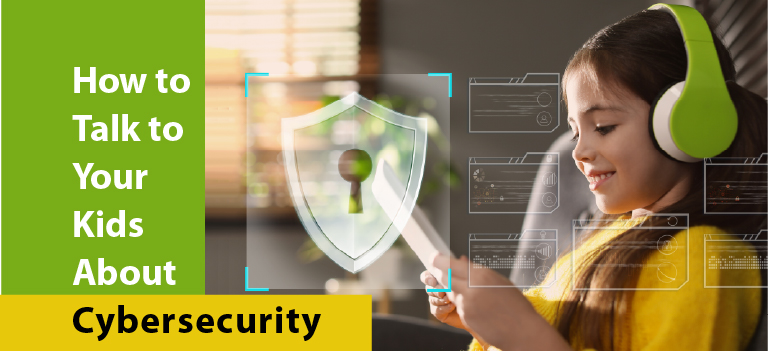As tech leaders, it’s important that we remember to connect with kids about the importance of online security. Teaching children about the dangers of the internet requires a bit of extra patience, but it also invites us to let loose and have fun. The past few years have taught us that we can’t keep our kids away from technology. It’s now an integral part of everything, including school! So, with that in mind, it’s important to meet our kids where they are and teach them the importance of cybersecurity from an early age. In this article, we’ll dive into practical guidelines for how to start the conversation with your kids about cybersecurity, and how to create space for them to voice their own worries about the internet and cybersecurity.
If your kids are using technology in any capacity, then you know it’s time to start talking to them about cybersecurity. Additionally, if you’re teaching your kids about physical dangers, you can also introduce them to the online dangers they can encounter.
Stranger Danger: Physical and Digital
As you teach your kids about the importance of not talking to strangers, you can also introduce the topic of not sharing personal information online. It’s important to ask questions like, “Is it safe to share your full name and phone number? What about your favorite color? How about your home address?” And see what types of responses they have for you.
Growing up, most folks were taught the basics of “stranger danger.” Kids these days have “stranger danger” on two planes: physical and digital. Stranger danger can occur on the street or while watching YouTube. In starting the conversation with your kids, you’ll be surprised at how much they already know. They may surprise you and actually be more risk-averse than you expect.
For children more unaware of internet risks, “stranger danger” might be a useful principle to apply when addressing the topic with them. For example, you can do the following:
• Establish that if they don’t recognize the person online, then they shouldn’t trust what that person says or sends.
• Explain that online strangers also pose risks. This may help them think twice before engaging with or clicking on a suspicious link. The same can be said for trusting apps or websites — if it’s not something they recognize, then they should not use it. And if they aren’t sure, they can find a trusted adult to ask.
• Encourage kids to have a “network of trust,” and help them list the apps, websites and online friends that are safe to connect with.
• Most importantly, encourage their natural curiosity. If they’re not sure about a particular scenario, take the time to talk to them about it, and consider doing some research together. Offer positive feedback when they ask questions and share their honest thoughts.
Encourage Questions
Cybersecurity will always be an ongoing conversation. It’s important to encourage their curiosity. You can also prompt them by asking some questions. Some of the top questions parents receive include:
• Can a hacker listen to my phone calls or read my text messages?
• What exactly is a landline, and how did the first hackers attack phones?
• Is it safe to use TouchID and FaceID on an iPhone?
• How and why do hackers do bad things?
• What’s the difference between a good hacker and a bad hacker?
• How would someone hack my Netflix account?
Kids are often smarter and far more observant than we give them credit for. They may notice and think about cybersecurity issues that would never cross our minds. Create space for them to voice their own worries about the internet and cybersecurity. You might be surprised by what they know.
Finally, never shame a child for making mistakes. If your child inadvertently shares sensitive information, connects with strangers online, or uses websites that are not safe, use it as an opportunity for education and support. Punishing kids for these types of mistakes can inadvertently encourage them to hide their activity, which can make it less safe for them in the long run.
Born Into a Cyber World
Cybersecurity may be a niche topic for many adults, but for children, it is part of the fabric of their lives. In this day and age, the internet is their source of entertainment, socialization and education. They are curious about how the internet works and whether it’s safe. They care about privacy. And like many of us, they love to show off their hobbies, pets, and loved ones.
It’s important to encourage kids to pay attention to their surroundings both offline and online. Talk to them about keeping their eyes out for people and websites that don’t sit right or feel right. And if they ever have questions, invite them to ask you questions.
The most important thing you can do is expose them to new ideas and foster curiosity. As you’ll quickly learn, children are interested in cybersecurity.
Caroline Wong
Tags: Internet, Kids, kids cybersecurity, Online Safety, YouTube


